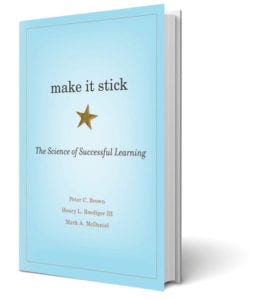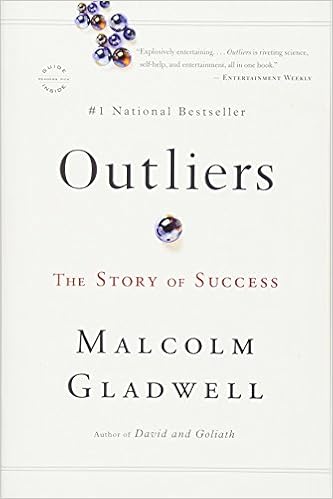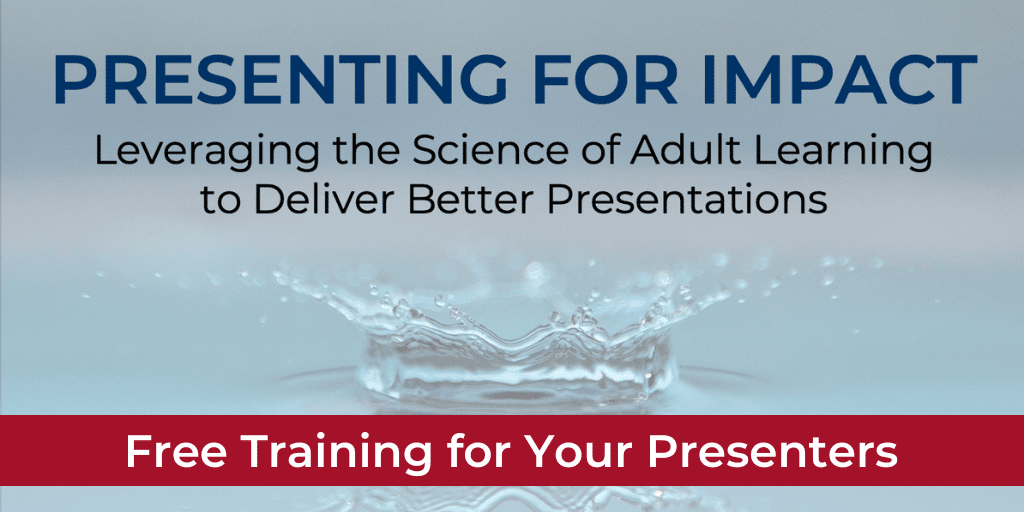As leaders in the business of lifelong learning, we often focus much of our time and money trying to design and deliver impactful learning experiences – whether that’s choosing the most knowledgeable subject matter experts we can find or trying to incorporate best practices about how adults learn.
But the reality is, learning is a two-way street and none of this matters if the learner isn’t engaged and doesn’t embrace responsibility for their own learning.
In this episode of the Leading Learning Podcast, co-hosts Celisa Steele and Jeff Cobb discuss a concept they hope will become a trend: learner responsibility. They talk about why we need to reassert the learner’s responsibility for learning, what it requires, and how we can support learners in embracing that responsibility.
To tune in, just click below. To make sure you catch all of the future episodes, be sure to subscribe by RSS or on iTunes. And, if you like the podcast, be sure to give it a tweet!
Listen to the Show
Read the Show Notes
[00:20] – In this episode, we’re going to talk about a topic that we think should be a trend, but isn’t as far as we can tell – and we invite listeners to disagree on our assessment by leaving a comment here in the show notes.
[00:43] – Thank you to YourMembership, executive sponsor of the Leading Learning Symposium and this episode of the Leading Learning podcast.
Learner Responsibility
[01:02] – The trend that will be discussed came to mind while planning for the Leading Learning Symposium. The event, designed specifically for senior leaders at organizations in the business of lifelong learning, got us thinking about how learning happens.
There have been positive trends in adult lifelong learning over the past several years.
Specifically, more organizations have recognized the need to do a much better job of grounding learning experiences in what we actually know about how adults learn.
We need to move away from the excessive emphasis on lectures that has characterized adult lifelong learning from time immemorial.
We also need to provide more opportunities for adults to interact and collaborate with each other (e.g., through communities), to learn from each others’ experiences, and to engage in various approaches to making learning stick.
There have been improvements in this area across organizations and we’ve tried these approaches in our Leading Learning events – Leading Learning Symposium and Learning Technology Design. (Recognizing all the while, of course, that learning is a process, not an event.)
Effortful Retrieval

[04:23] – The reason learner responsibility is so important is because meaningful learning requires effort.
It requires effortful retrieval, a concept highlighted in Make It Stick: The Science of Successful Learning.
The book is one of the Emphatically Recommended Readings™ for the Leading Learning Symposium and we also interviewed the book’s co-author Peter C. Brown in a previous podcast episode.
Self-Testing
[05:34] – Related to effortful retrieval is the idea of self-testing.
There has been great research by John Dunlovsky and others to find out what the most effective strategies are that actually lead to better learning. Dunlovsky’s research only identified two strategies and self-testing was one of them.
Distributed Practice/Spaced Learning

[06:19] – Another key technique for engaging as a learner is distributed practice or what is often referred to as spaced learning.
This is the idea that you need to practice something at intervals over time in order to really learn and apply it.
This is related to deliberate practice and draws on the work of Anders Ericsson that has been established through years of research.
Malcom Gladwell also popularized this and the concept of 10,000 hours of practice in his book Outliers.
This is also summarized in Ericsson’s book Peak: Secrets from the New Science of Expertise.

Essentially, in order to be effective, you need to put in effortful, deliberate, practice designed to stretch yourself.
What It Takes to Be a Successful Learner
[07:51] – The commonality across all of the above is that they are highly dependent upon the learner – the learner has to be engaged, motivated, and disciplined.
We as facilitators/instructors can’t do it for the learner, the learner has to do it for herself. As developers of learning experiences, we can and should do as much as possible to facilitate all of these things.
But we shouldn’t delude ourselves that we can design “learning experiences so perfect that no one will need to try”.
Learners simply have to step up if real learning is going to happen. While this is easy to say, it is not necessarily easy to achieve.
There is a “rub” when it comes to adult learning – namely, that most of us are not all that well prepared to be effective adult learners.
Our traditional approaches to schooling simply have not taught us enough about how to be effective learners. We have to look at how we can best help the learners understand how best to learn.
Many of us haven’t learned effective learning strategies, particularly those who have already entered the other fifty years and are beyond the influence of the K-12 and higher education systems.
This is an area that needs to be addressed and it falls to the organizations serving them to help bring about this sense of learner responsibility and accountability.
Ways to Encourage Learner Responsibility
[12:03] – 3 things you can do to build learner responsibility:
- Integrate education about learning into major member touch points.
Education in how to learn effectively should be an integral part of every major meeting – part of the opening and closing sessions and woven throughout.
It could also be a complement to a Webinar series and other forms of online learning, and can also be discussed in publications. It should be addressed frequently and consistently, using good learning practices.
This doesn’t have to be a patronizing practice and even if anyone is already familiar with the concepts, it is still helpful to keep reminding them because it needs to be shared over time.
[15:19] –
- Fully enlist and support subject matter experts.
Presenters and other subject matter experts tasked with facilitating learning need to be on board with educating learners about learning and need to be educated themselves. One approach (and a free one at that!) to education subject matter experts is Presenting for Impact.

[16:29] –
- Be an avatar of learning.
If we expect our learners to do more than go through the motions when it comes to lifelong learning, to fully embrace responsibility, then we must do it ourselves. In many cases, we don’t make the time to embrace good habits in our own professional development and lifelong learning.
As we’ve argued before, to be a leader is to be an avatar.
This involves risk-taking. We modeled this at the Leading Learning Symposium with the use of collaborative consulting – aka “hot seats.”
Creating a Culture of Learning
[18:48] – It’s important to create a culture of learning.
For example, we have a standard survey question that asks how often people are attending any sort of formal educational experience (online or face-to-face).
Although this isn’t a perfect measure, it is a sign that there is a culture of learning and education across the audience that’s being served.
As a leader in your organization, you should celebrate the concept of learner responsibility because it is a fundamental concept to any organization’s mission that has continuing education, professional development, and lifelong learning as part of the services it’s providing. The idea of learning is integral to being a leader – in order to lead, you need to be learning.
Check out our podcast where we discuss what it means to lead learning.
You can also read Jeff’s blog post to learn more about learner responsibility.
[22:15] – Wrap-Up
Thanks again to YourMembership, executive sponsor of the Leading Learning Symposium and this episode of the Leading Learning podcast.
If you are getting value from the Leading Learning podcast, be sure to subscribe by RSS or on iTunes. We’d also appreciate if you give us a rating on iTunes by going to https://www.leadinglearning.com/apple.
Also, please tell others about the podcast. Go to https://www.leadinglearning.com/share to share information about the podcast via Twitter, or send out a message on another channel of your choosing with a link to https://www.leadinglearning.com/podcast.
[24:13] – Sign off
See Also:



Leave a Reply